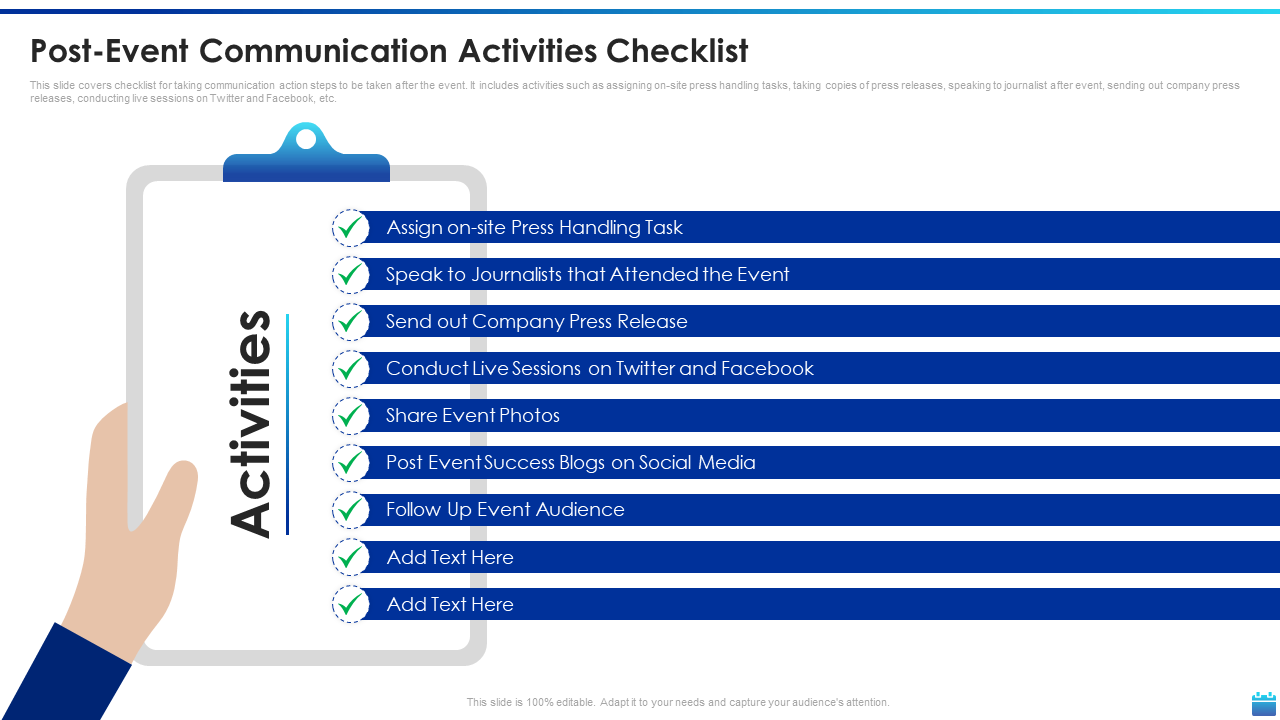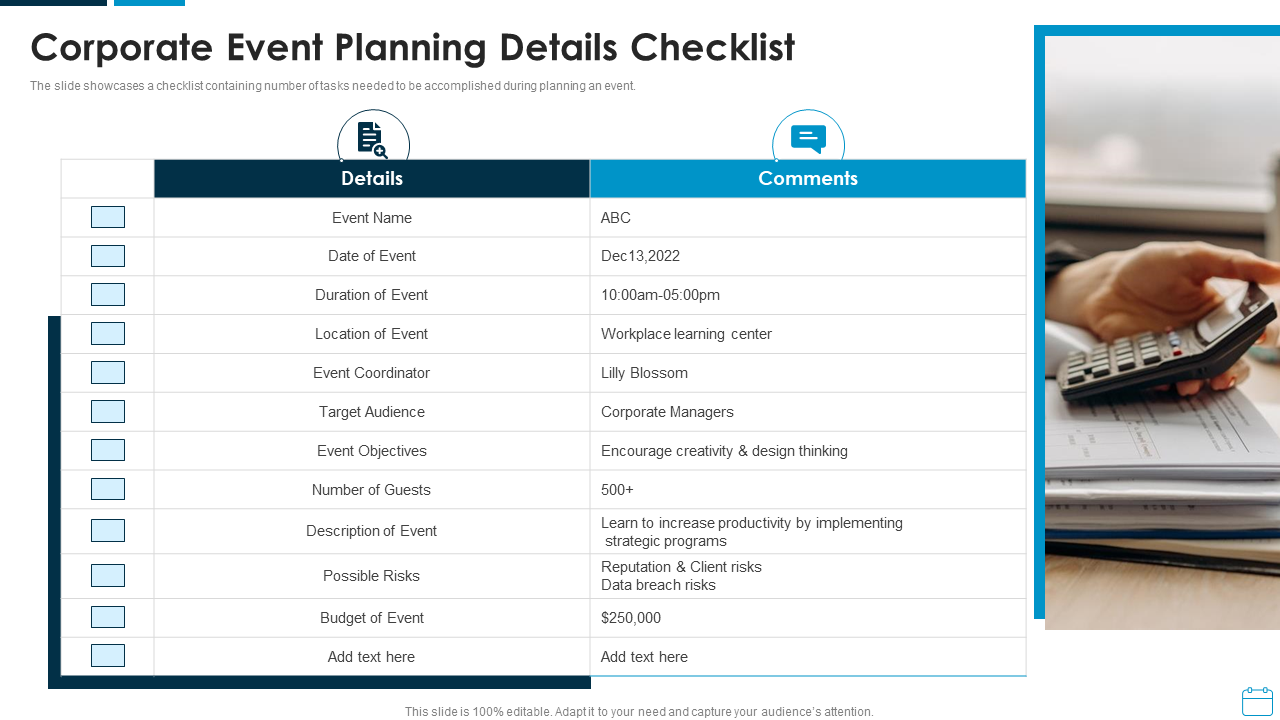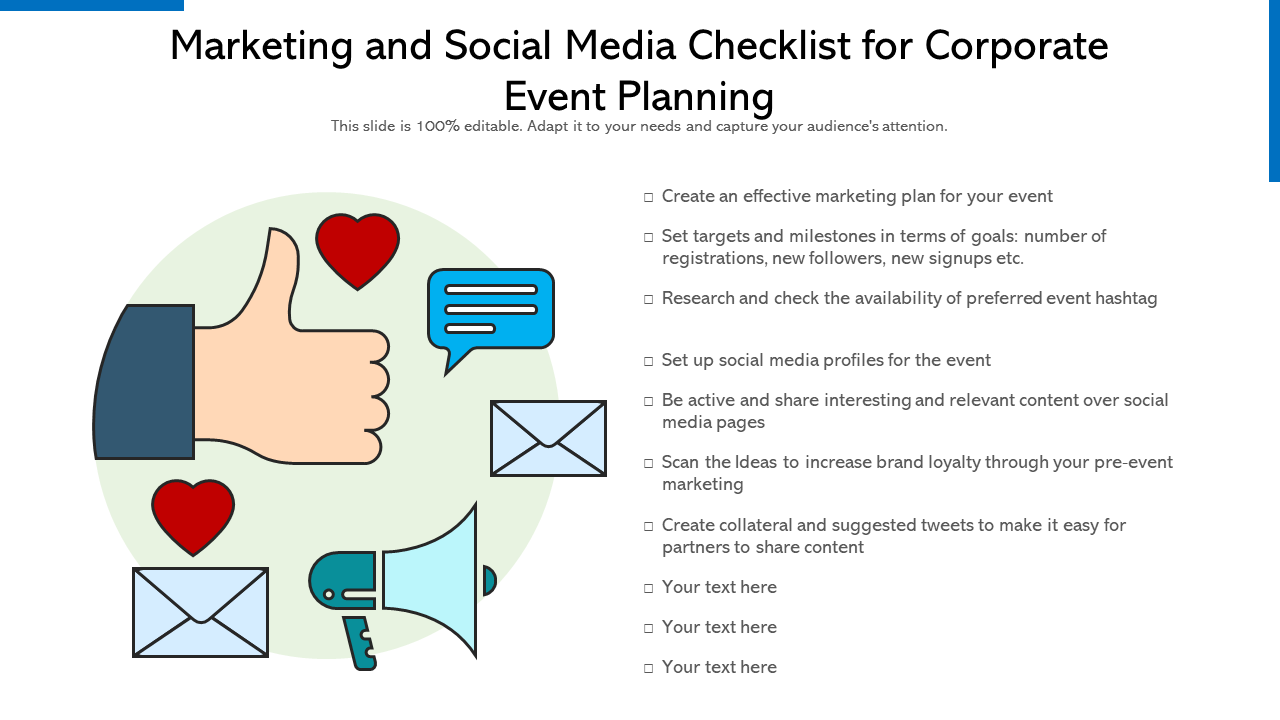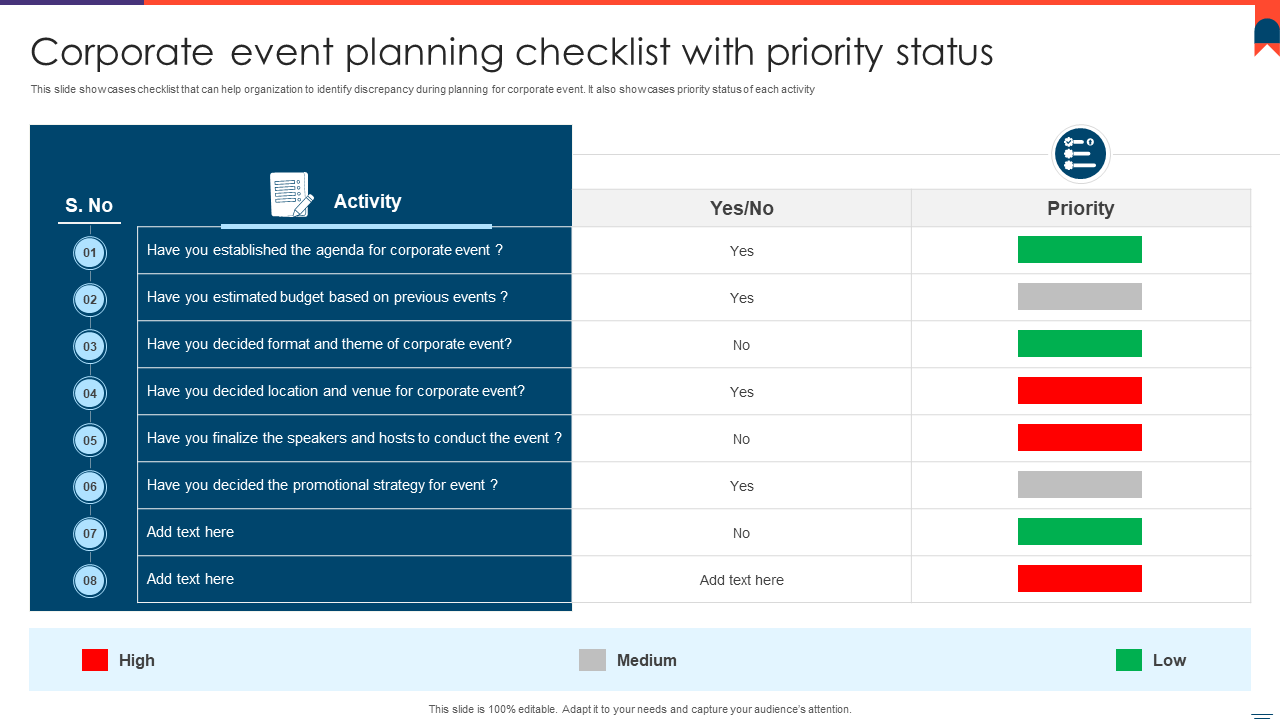Corporate event planning can be daunting, with multiple stakeholders and various moving parts to manage. Whether it's a conference, product launch, or team-building activity, a well-organized event can leave a lasting impression on attendees and boost brand image. One key to successful event planning is a comprehensive checklist to ensure all aspects of the event are covered.
A must-have corporate event planning checklist Template is exactly what you need to ensure that your event goes off without a hitch.
With a comprehensive checklist Template, you can easily keep track of every aspect of your event, from booking the venue to sending out invitations and arranging catering. No detail is too small to include, and by using a pre-made Template, you can be sure that you're not forgetting anything important.
This blog explores some must-have corporate event planning checklist Templates to help you stay organized and focused throughout the planning process. Instead of constantly worrying about what still needs to be done, you can simply refer to your checklist and tick off completed tasks as you go. This reduces stress and makes the entire process much more manageable.
Alternatively, if you are looking to explore some business checklist templates, you can do that here!
Browse the collection below and stay organized throughout the planning process.
Template 1: Post-event Communication Activities Checklist Template
This content ready PPT Template is a must-have tool for any event planner to encourage communication and interaction among team. The Template is easy to use and includes essential points of post-event activities such as, thanking attendees, gathering feedback, sharing event highlights on social media, and updating stakeholders on the event's success. Event planners can streamline their post-event communication strategy and ensure a successful outcome that boosts brand image and attendee satisfaction.
Template 2: Corporate Event Planning Details Checklist Template
Introducing a comprehensive tool that you can use to manage every aspect of your event. This ready-made PPT Template is perfect to guide event planners through the entire planning process, from initial concept to final execution. The actionable PowerPoint Template includes details of each activity and comments next to it to keep track of all parameters. The checklist ensures no detail is overlooked and creates a memorable and successful event.
Template 3: Marketing and Social Media Checklist Slide for Corporate Event Planning
This is a professional and appealing Template for event planners looking to maximize the impact of their event on social media and other digital channels. It provides you with an in-depth checklist of tasks to ensure that your event is marketed and promoted on social media platforms. By using this Template, event planners and corporate managers can reach to a wider event audience, drive engagement, and build brand awareness. This Template is an essential tool to leverage the power of social media to create a successful event.
Template 4: Corporate Event Planning Checklist with Priority Status Template
Here's another amazing ready-made PowerPoint Template showcasing a detailed checklist of tasks required for successful description event planning and a priority status feature that enables planners to identify the most critical tasks. The Template includes sections for all the key elements of event planning, including venue selection, catering, entertainment, marketing, and logistics. The priority status feature allows planners to highlight the most top-priority tasks ensuring that deadlines are met and the event is executed with ease. It can save event planners time and effort, allowing them to focus on creating a successful event.
EXPLORE THESE CORPORATE PLANNING TEMPLATES TODAY!
We hope these corporate planning Templates would have motivated you to plan your next event in style. Remember, what is planned well, is executed well also! Go ahead and explore them today!
Download these premium PPT Slides through our monthly, semi-annual, annual, annual + custom design subscriptions here.
FAQs on Corporate Event Planning
What are the seven stages of event planning?
The seven stages of event planning include the following:
- Defining the purpose and goals of the event: This involves identifying the reason for hosting the event, such as a product launch, charity fundraiser, or social gathering.
- Establishing a budget and selecting a venue: An estimated budget must be established to determine how much can be spent on the event. This involves deciding on the ticket price (if applicable), food and beverage costs, decorations, entertainment, and other expenses. A venue must also be selected that can accommodate the number of attendees and fit within the budget.
- Creating a timeline and action plan: A detailed timeline and action plan must be created to ensure that all tasks are completed in a timely manner. This involves setting deadlines for tasks such as booking vendors, sending invitations, and creating marketing materials.
- Identifying and selecting vendors and suppliers: Vendors and suppliers such as catering companies, entertainment providers, and rental companies must be identified and selected based on their ability to meet the needs of the event and fit within the budget.
- Marketing and promoting the event: This involves creating a marketing plan to attract attendees to the event. This can include creating flyers, social media posts, and email campaigns.
- Managing logistics and coordinating event day operations: On the day of the event, logistics such as setting up the venue, managing vendors, and ensuring attendees are comfortable and safe must be coordinated.
- Evaluating the event and measuring its success: After the event, its success should be evaluated by analyzing attendee feedback, revenue generated, and other metrics.
What are the 5Cs of event management?
The 5 Cs of event management are the essential elements to consider when planning and organizing an event. They are as follows:
- Concept: The event concept is the idea or theme behind the event and should align with the overall goal and purpose of the event.
- Coordination: This involves the coordination and management of all aspects of the event, from the venue to vendors, staff, and attendees.
- Control: Control refers to managing and overseeing the event to ensure that it stays on track and within budget.
- Culmination: The culmination is the climax of the event and should leave a lasting impression on attendees.
- Closeout: Closeout involves wrapping up the event, including settling outstanding debts and evaluating its success to guide future planning efforts.
What should be included in a corporate event?
To ensure a successful corporate event, it is crucial to carefully plan and organize the gathering with specific objectives and goals in mind. Important factors to consider include the following:
- Having a clearly defined purpose
- Engaging content, an appropriate venue
- Effective communication
- Well-coordinated logistics
The event should also align with the company's brand image and values while leaving a positive and lasting impression on attendees. Depending on the event's purpose, it may include keynote speakers, workshops, networking sessions, entertainment, and team-building activities. In designing the event, it is essential to consider the target audience's preferences and needs and ensure that all aspects of the event including possible risks, support the company's overall strategy.
How do I start a corporate event plan?
To start planning a successful corporate event, you first need to determine the event's purpose and objectives. Consider the target audience, desired outcomes, and company's overall strategy. Once you have a better idea of what you want to achieve, identify a suitable venue and date that can accommodate your expected attendance. Develop a budget that accounts for all the necessary expenses, such as catering, equipment rentals, and event staff. Select engaging content that aligns with your event's purpose, such as keynote speakers, workshops, or team-building activities. Finally, coordinate all logistics, including invitations, transportation, and accommodations, to ensure a seamless and successful event.
How do you plan a small corporate event?
Planning a small corporate event can be just as important as a larger event, but with fewer logistical complexities for an event coordinator. Start by defining the purpose and objectives of the event and consider the target audience and desired outcomes. Choose a suitable venue that can accommodate your expected attendance and aligns with your budget. Identify engaging content that aligns with the event's objectives, such as guest speakers or team-building activities. Coordinate all logistics, including catering, audio-visual needs, and event staff, to ensure a seamless experience. Finally, communicate the details of the event to attendees in advance, including the schedule, parking, and any other pertinent information.


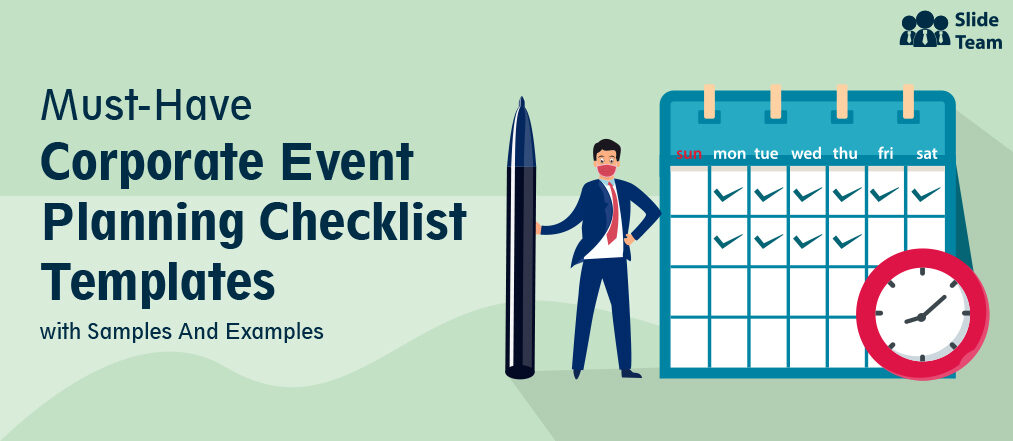
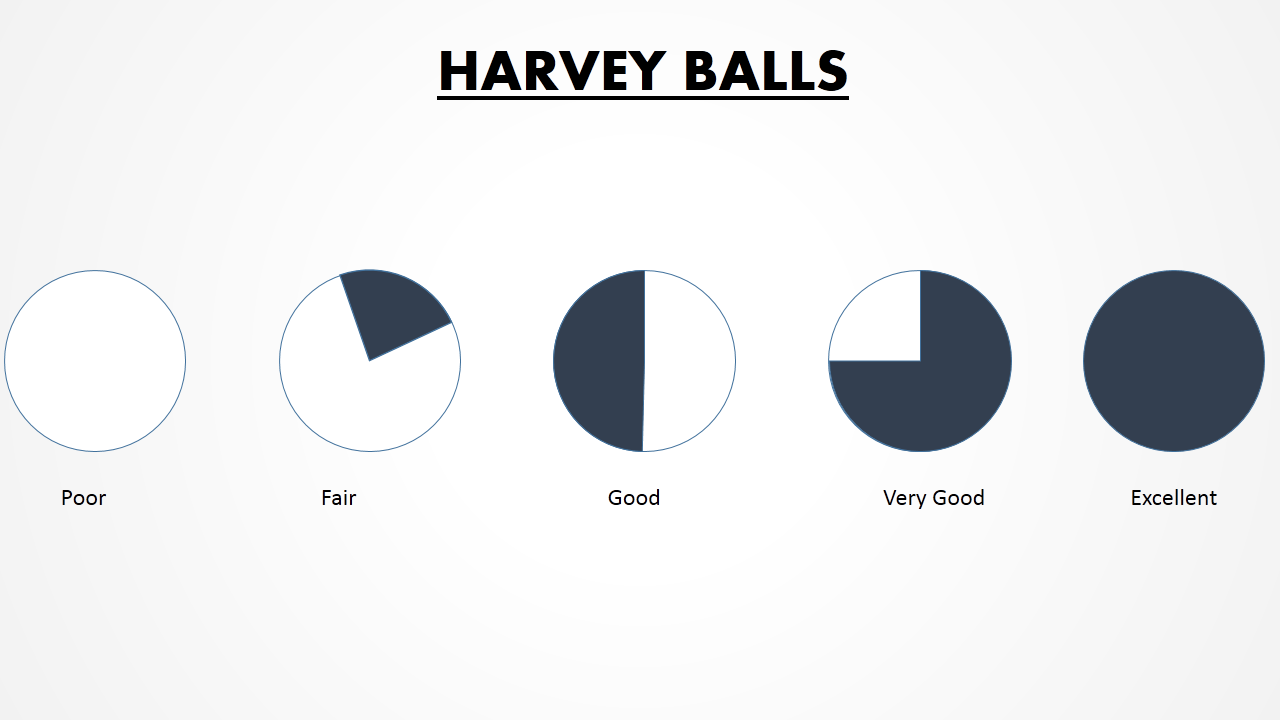

 Customer Reviews
Customer Reviews

